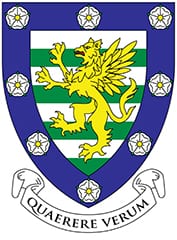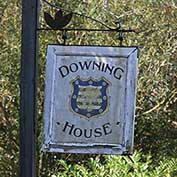By Eleanor Kucia, writing in 1995

Downing College crest.
Ishbel Beatty writes There were a number of 50th anniversaries in 1995, with September bringing a special one to this neighbourhood.
In that month in 1945, the west Cambridgeshire estate owned by Downing College was put up for auction – all 4,151 acres of it.
Those acres lay in the parishes of East Hatley, Tadlow, Gamlingay, Wrestlingworth and Croydon-cum-Clapton. They had been awarded to George Downing, together with a baronetcy, at the Restoration in 1660.
Three baronets of that name lived in East Hatley or Gamlingay until the estate helped to found Downing College, Cambridge, in 1800. Then in 1945, since no offer was made for the estate as a whole, it was sold in separate lots, mostly to existing farming and cottage tenants.
The name Downing has remained on one property in the area – the Downing Arms (now Downing House), once a farmhouse, became licensed as a public house in 1827 and continued so with its second name, ‘The Scratching Cat’ – so called because locals did not recognise the Griffin on the pub sign: look at the College’s arms and you will see why it got that name. It closed in 1995.
It also seems to have lead to the title of the company nearby – ‘The Flying Cat’! The building, now a private house, still stands on the Arrington / Tadlow road, looking up at the slopes towards East Hatley, where the third Sir George once built a prospect tower. This crumbled away with the old farmhouse at Tower Farm before the 1960s.
The Downing Arms was where the College Bursar went to collect the annual rents from the farm tenants for over a century. Mrs Alex Kucia, born Eleanor Harbon in Tadlow, writes of her memories of rent day in her childhood.

The sign for Downing House on Lower Road, Croydon – once The Downing Arms and now a private residence, it was better known as ‘The Scratching Cat’.
“Solid slabs of fruit cake, rich in cherries – that is my dominant memory of Rent Day. It was the one day in the year when I sampled ‘shop cake’ and I thought it wonderful. And I still enjoy a slice of well cherried slab cake.
“When I was seven years old, the old thatched cottage we lived in, one-time Tadlow Vicarage according to historian William Cole, was condemned as unfit to live in and we moved to a newly-built council house nearby.
“However, we still went to the Michaelmas Rent Day at The Downing Arms where the Bursar of Downing College collected his dues, as my father continued to rent the orchard and garden where the old house had stood. Our chickens were kept there and the gnarled old fruit trees still yielded well.
“I have puzzled as to why my memories of the actual tea are so sketchy, and can only assume that the ‘feast’ ceased soon after the outbreak of World War II, though the rent of course still had to be paid. So I have chatted with various ex-Tadlowites in order to build up a composite picture.
“In the morning, some of the village ladies went to ‘The Cat’ to set up trestle tables and benches in what was known as the ‘Big Room’. In the afternoon the women and children either walked or cycled to the pub, including those from Wrestlingworth who lived in Downing-owned houses.
“We were served with tea by the two Miss Turrells, sisters of the landlord Frank Turrell, who also farmed the surrounding land. The pub and farm belonged to Downing College, of course.
“Tea was poured, already milked, from large jugs. No-one seems to remember what else was served, yet, as we sat formally at table, there must have been bread, meat or sandwiches served as well as that cake.
“Harold Sadler, some ten years my senior, remembers attending rent day tea with his mother and sister, and is also able to confirm my memory of all the men going for supper in the evening. (I have seen it recorded somewhere that only the farmers etc. had supper, but I was sure my dad, an ordinary farm worker, also went.)
“Harold thinks the supper was of boiled beef and vegetables, and he and his sister recall going back to ‘The Cat’ the next day with a milk can. This was a container like a small lidded bucket holding about a quart of liquid and used by the farm workers to carry home their daily allowance of milk from the farm.
“The can was filled on their call at The Downing Arms with delicious broth, probably made from the liquid the meat had been cooked in. I suppose I wasn’t old enough to make the trip, as that was news to me.
“In 1945 the whole Downing estate was sold, and Rent Day, with or without its tea and supper, was no more. The cottages were split between the farms and became tied cottages, some farmers charging rent, others including a free tenancy as part of the wages.
“At the time of the sale, the rents quoted in the catalogue for typical labourers’ cottages varied between £3 8s 2d for a semi and £4 6s 6d for a detached home – that was for a year! The orchard and garden where the old vicarage had stood (it was Glebe Cottage in my time there) was offered for sale as a building plot, the annual rent then being 5s.
“My father’s employer, Owen Randall of Bridge Farm, bought it for £30 and let my dad pay for it in instalments. A record greengage crop the following year raised enough cash to clear the debt – after which the greengage trees never again produced a decent harvest! – and passed into memory as did the cherry cake of Michaelmas Rent Day.”
Gamlingay Gazette, September 1995
Re-published on the original Hatley website, August 2006; with minor changes for this website, October 2018.

